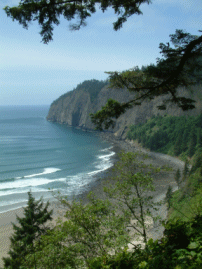
|
Earth and Environmental Science Graduate Courses 2005-2006405. Paleoecology. Bordeaux The relationship of fossil assemblages to life assemblages; structure of ancient communities, and interaction of organisms with each other and with the physical environment; evolution of communities. 415. Paleobotany. Pfefferkorn Fossil record and evolution of plants. Methods and application of paleobotanical research. 417. Advanced Petrology. Omar Chemistry, physics, phase equilibria, microscope study in igneous and metamorphic petrology. 418. Geochemistry. Omar This course provides a comprehensive introduction to theory and applications of chemistry in the earth and environmental sciences. Theory covered will include nucleosynthesis, atomic structure, acid- base equilibrium, thermodynamics and oxidation-reduction reactions. 420. Introduction to Geophysics. Doheny Concepts of geophysical modeling, inverse problem solving, numerical methods, and computer methods as applied to geophysics. Radioactivity, heat transport in the Earth, and magnetic fields, rock magnetism, and seismology. 501. Pleistocene Geology. Giegengack Origin, extent in space and time, and effect on geologic processes of Late Cenozoic climatic change; Pleistocene stratigraphy in different parts of the world. 502. Data Analysis and Computer Modeling in Geology. Phipps Data analysis from simple parametric statistics to multivariate statistics, including cluster and factor analysis. Additional topics include: Bootstrapping, Markov chains, runs tests, spectral analysis, and other general techniques to analyze data sequences and time-series. Map studies include: analysis of distributions of points and lines, directional data, spherical distributions, shape and trend surfaces. 504 Resource Geology. Staff Petrology of economic mineral resources. 511. Geology of Soils. Johnson Nature, properties, genesis, and classification of soils; soils of the United States. Field trips. 515. Evolution/Revolution of Land Ecosystems. DiMichele/Wing. Origin and diversification of land ecosystems. Interaction between plants and animals. Effects of Past climatic change and other external factors. The importance of past changes in land ecosystems to our understanding of current global change. 517. Igneous and Metamorphic Petrology. Omar 520. Nuclear Geology. Omar Natural radioactivity, Earth's heat, nuclear age determination, geochemistry of stable isotopes, and geological applications of nuclear technology. 525. Plant Paleoecology. Pfefferkorn Deciphering the ecology of fossil plants, ecosystems and landscapes through quantitative and qualitative methods 528. Aqueous Geochemistry. Johnson Chemical composition and interactions of soil water with applications to current problems. 530. Hydrogeology. Mastropaolo Flow of water (and associated contaminants) in natural porous media. 535. Macroevolution. Staff Topics in evolution: speciation, extinction, rates of evolution, the origination of higher taxa and novel forms, adaptive radiation, mass extinction, species selection, and escalation of biotic interaction. Special emphasis will be given to topics of interest to the students. 540. Geotectonics. Phipps Bulk structure of the Earth and the plate tectonic paradigm. Plate boundary types, geometry and processes. Regional plate tectonics. Field trips. 546. Regional Geologic and Environmental Analysis. Scatena/Phipps In-depth study of selected depositional basins using petrologic, stratigraphic and seismic techniques. Aspects of depositional processes and basin architecture will be considered in light of the formation of the tectonic regime associated with basin formation. 555. Problems in the Early Evolution of Vertebrates. Dodson An analysis of key problems in the paleontology and evolutionary biology of early vertebrates, including: origins of chordates, bone and other hard tissues, organization of the vertebrate head and major clades. 602. Geotechnics. Doheny. Introduction to geotechnical engineering. 604. Biogeochemistry. Vann. Examination of the action of biology in the geochemical cycling of elements on Earth. Elemental cycling in sediments, terrestrial and marine/freshwater ecosystems and global interactions. 604. Geostatistical Analysis. Vann. Univariate and multivariate approaches to the analysis of spatial correlation and variability. 605. Advanced Paleobiology Seminar. Staff. Current topics in paleobiology. 606. Topics in Sedimentary Petrology and Stratigraphy. Pfefferkorn Analysis of selected paleoenvironmental, stratigraphic and sedimentological problems in the field and laboratory. 609. Advanced Stratigraphy. Horton 611. Field Study of Soils. Johnson Processes of soil development in a variety of temperate environments. Effects of lithology and climate on soil properties. Field trips. 613. Hydrology. Johnson Basic concepts and principles of hydrology. 615. Advanced Vertebrate Paleontology Seminar. Dodson Topics in vertebrate paleontology and paleoecology. 616. Geology of the Carboniferous Period. Pfefferkorn Paleogeography, biogeography, stratigraphy, paleoclimatology, flora and fauna of the Carboniferous Period. 618. Geochemistry Seminar. Omar Topics in geochemistry. 620. Geophysics Seminar. Doheny Topics in solid Earth geophysics 624. Geologic Remote Sensing. Staff. Geologic applications of remotely sensed images and other data. 625. Advanced Paleobotany Seminar. Pfefferkorn Topics in paleobotany, paleoecology, and evolution. 626. Seminar in Fluvial Sedimentology. Pfefferkorn Exploration of fluvial sedimentology in different climates and topographies. Emphasis on sedimentary basins. Modern and fossil environments compared. 630. Advanced Structural Geology Seminar. Phipps Topics in structural geology and tectonophysics. Four-day field trip. 635. Seminar in Environmental Geology. Giegengack 640. Topics in Global Geology. Staff Selected topics in planetary-scale geology. 650. Seminar in Appalachian Geology. Staff Late Proterozoic to Triassic evolution of the Appalachian orogen. Couse is synthetic, but may have a stratigraphic, structural, petrological or plate-tectonics emphasis. 654. Geomechanics. Doheny Mechanical properties of solid and fluid earth materials, stress and strain, hydraulics. 655. Engineering Geology. Doheny 666. Geology Field Work. Giegengack. Four-eight week summer course. 677. Seminar in Environmental Geology. Giegengack 706. Topics in Regional Geology. Phipps. Regional geologic synthesis and tectonics. Emphasis on foreland and depositional basins. 715. Paleobiology Seminar. Staff Current topics in paleobiology 716. Coal Geology. Pfefferkorn Origin of coal, coal petrology, geology of coal bearing basins. 777. Seminar in Quaternary Environments. Giegengack Interdisciplinary approach to selected environmental problems of the Pleistocene. |

|
| Department of Earth and Environmental Science University of Pennsylvania, 254-b Hayden Hall, 240 South 33rd Street Philadelphia, PA 19104-6316 |